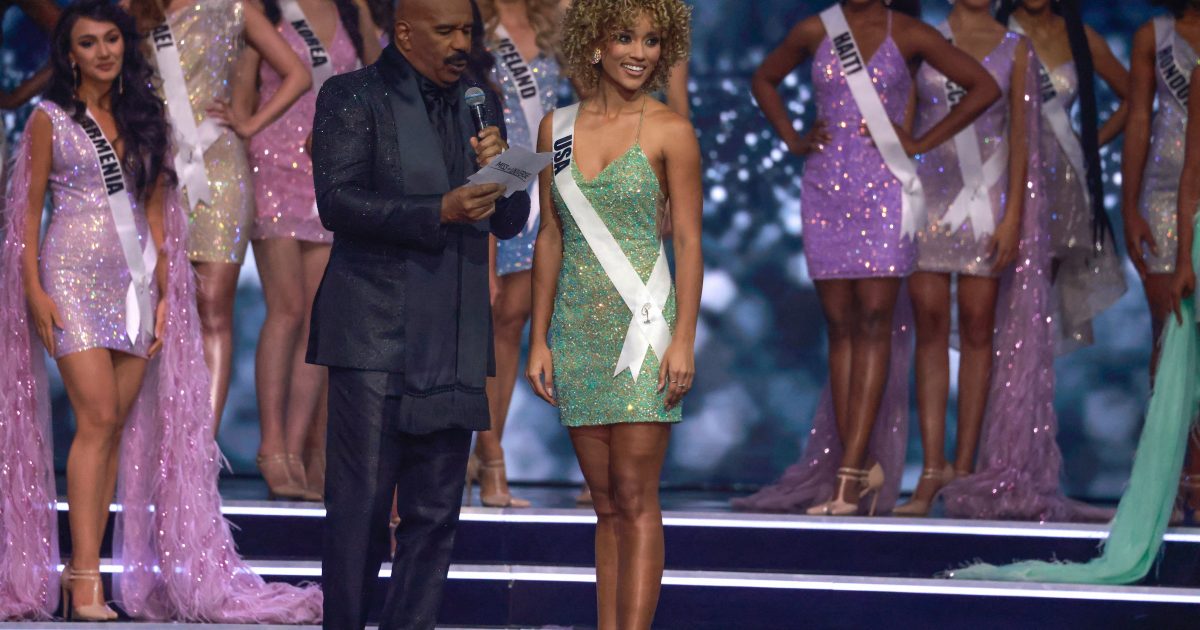Turning to Loss Into Connection
- Elle Smith was crowned Miss USA 2021, and she is already using her platform to turn her grandmother’s cancer battle into an opportunity to empower and educate others about the importance of cancer screening.
- Smith’s grandmother was first diagnosed with cervical cancer when Smith was just 15. She went through treatment and entered remission, but two years later, the cancer came back and she passed away.
- Nearly all cases of cervical cancer are caused by HPV, or human papillomavirus. HPV puts both men and women at risk of developing several other cancers as well including cancers of the vagina, penis, anus and throat. An HPV vaccine is available and recommended for children as young as 9 years old.
The choice of her platform, however, was all on her.
Read More
Taking Action
A Springfield, Ohio native, Smith set her plan in motion just weeks after her reign began and barely a week after she flew back from Israel where she finished in the Top Ten at the Miss Universe pageant. First up, a meeting with the National Cervical Cancer Coalition to discuss how best they can collaborate."I want to advocate for education and awareness," says Smith of her ambitious goals. "It’s also important to create a safe space where we bring survivors together who can meet and talk about their experiences. I can learn from them as well because grandma's not alive, and I have never had cervical cancer."
Even in elementary school, parents should start thinking about the HPV vaccine, which protects against the virus that causes most cases of cervical cancer.
The former on-air television reporter with WHAS-TV in Louisville, Kentucky is already in that advocacy role in her own family.
"I'm in a group chat with all of my aunts [her grandmother had four daughters and a son]. Right when I won Miss Kentucky USA, the first text that I sent was: 'When was the last time everyone got a Pap screen?' Thankfully because of grandma, everyone's up to date," says Smith, who talks fondly of her childhood. One of the highlights: Grandma’s home made pancakes to entice her to drop by as she made her way to school every morning.
"Gynecological health is uncomfortable to talk about for so many women, but it’s a necessary conversation. The more we put it in the spotlight; the more we highlight cervical cancer as a whole; the more women will feel comfortable talking about that."

The Story Behind Her Platform
After her grandmother's cervical cancer diagnosis, Smith learned that she had not been getting any preventative screenings. "Selfishly, I was angry. I was like 'Why? You had access to medical care, you could afford it, why weren't you doing it?' I truly think it was the lack of education. She just wasn't aware that she needed to be doing these things. That was frustrating to find out about."
Armed with her new title, Smith, aims to turn those conflicting childhood feelings into a force for good. "I remember going to grandma's chemotherapy and feeling like I didn’t want to be there," she recalls. "The smell of the hospital; seeing everyone was sick. It ended up being such a blessing. Grandma made friends wherever she went. I got the privilege of hearing her joke with all the other women and men there. As an adult I look back at the time and am grateful that I went but at the moment I was truly selfish thinking 'Why am I here? Why do I have to sit here?'"
She now thinks of that time they spent together as a powerful source inside her. A self-described "awkward child," Smith knows her grandmother would be surprised at her pageant ambitions. At the same time, she's confident that her grandmother would be "extremely proud" of her "for just going for it and not listening to everybody who said 'You can't do this; you’ve never competed in pageantry before; you don't know what you were doing.' I think she was with me going 'You can do it.'"

Her Grandmother’s Journey
It was "a little bit” of a shock for her to learn of her grandmother's cancer diagnosis. "I was old enough [15] to understand what was going on but young enough to still be a little bit naive about the magnitude of the whole situation. She went into remission; then two years later [the cancer came back and] it was very quick, only a couple months. That was frustrating. I don't think anybody is ready to lose someone that close to you."
Everything you need to know about the HPV vaccine
The story that defines "the free spirit" Amy Ellen Smith is this, says her granddaughter: "One day I called her, I was 12 years old, I said 'Grandma, we should go to Montana, on a road trip out West.' Three days later, my brother, my best friend and I and my grandma took off for a three week road trip. She just took us kids, my aunt lives in Montana so we did have family. She was one of those people you really couldn't confine to typical 9 to 5. She did whatever she pleased. I hope some of her traits were passed down to me."
As Smith formalizes her strategy to raise "awareness and education in hopes that more women can get preventive screenings," she is hopeful this work will prevent other families from the hole she feels her grandmother's too early death at just 60-years-old has left in her own world.
"It was so tragic when she passed away. She was the glue that held her entire family together and we lost that person," explains Smith. "It really hasn't been the same since we lost her in regards to the unity as a whole that we once had. That's what makes me sad."
Given a chance to see her grandmother again, to share these last incredible pageant filled years, Smith knows exactly what she would do. "Honestly I would just hug her and say 'I hope you’re proud of me.' That’s it."
Understanding Cervical Cancer
About 14,480 new cases of invasive cervical cancer will be diagnosed in 2021, and about 4,290 women will die from cervical cancer. This is why getting screened for cervical cancer is critically important.
Getting an earlier cervical cancer diagnosis may mean a better prognosis and broader treatment options. Screening for this type of cancer is done via a Pap smear and human papillomavirus (HPV) testing, which is recommended by the World Health Organization as the best screening option for cervical cancer. Cervical cancer treatments may include surgery, radiation and chemotherapy.
Cervical Cancer Prevention
It isn't clear whether HPV was the cause of Miss USA 2021’s grandmother's cervical cancer. But one way to significantly decrease your risk of developing this type of cancer is with the HPV vaccine.
In an earlier interview with SurvivorNet, Dr. Jessica Geiger, a medical oncologist at Cleveland Clinic Cancer Center, explains the importance of the HPV vaccine as prevention against cervical cancer.
Why the HPV Vaccine is so Important in Preventing Cancer
"We recommend strongly that children are vaccinated against HPV to prevent cervical cancer," she says, "but also to prevent head and neck cancer."
"HPV is spread through sexual contact," she adds. "Now the key with the vaccine is that you received the vaccine before you ever reach sexual debut or have sexual encounters. So that's why these vaccines are approved for young children ages 9, 10, 11 years old, up to 26."
"HPV is a virus that's actually very well spread throughout Western society. Fortunately, for the majority of us, over 90 percent, we clear the virus without ever knowing that we were exposed."
Learn more about SurvivorNet's rigorous medical review process.


